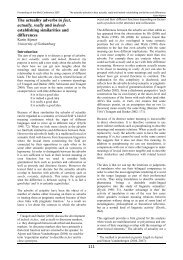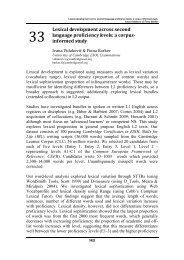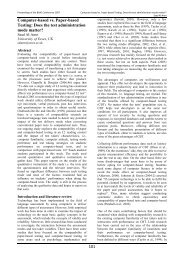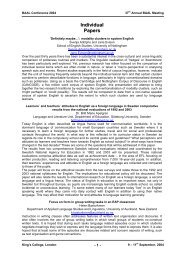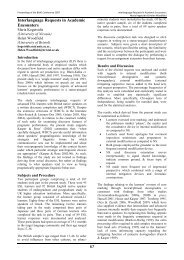Proceedings of the - British Association for Applied Linguistics
Proceedings of the - British Association for Applied Linguistics
Proceedings of the - British Association for Applied Linguistics
Create successful ePaper yourself
Turn your PDF publications into a flip-book with our unique Google optimized e-Paper software.
The Impact <strong>of</strong> <strong>Applied</strong> <strong>Linguistics</strong>: <strong>Proceedings</strong> <strong>of</strong> <strong>the</strong> 44th Annual Meeting <strong>of</strong> BAAL<br />
University <strong>of</strong> <strong>the</strong> West <strong>of</strong> England<br />
<strong>of</strong> a modern <strong>for</strong>eign language <strong>for</strong> all under 16s in secondary schools, or<br />
attempts to include questions about language in <strong>the</strong> national census. (In <strong>the</strong><br />
2011 UK census <strong>the</strong>re was one woefully inadequate such question, "What<br />
is your main language?", with main language glossed in <strong>the</strong> falsely<br />
personal style <strong>of</strong> public relations, as:<br />
Your main language is your first or preferred language. It could be <strong>the</strong><br />
language you were brought up using, <strong>the</strong> one you feel most com<strong>for</strong>table<br />
using, <strong>the</strong> language you use at home, or <strong>the</strong> one you use most <strong>of</strong>ten.<br />
– a question and an explanation which are so vague and ill-defined that <strong>the</strong><br />
question is impossible to answer <strong>for</strong> many bilinguals.)<br />
In <strong>the</strong>se matters <strong>of</strong> public language policy <strong>the</strong>re is clearly potential <strong>for</strong> a<br />
positive influence and no want <strong>of</strong> trying on <strong>the</strong> part <strong>of</strong> applied linguistics.<br />
Many applied linguists struggle valiantly to be heard, to influence national<br />
policy, but <strong>the</strong>ir voices are all too frequently ignored. Does that lack <strong>of</strong><br />
success make <strong>the</strong>ir research less worthwhile or <strong>of</strong> lower academic merit<br />
than those whose ideas do obediently fit in with government policy? My<br />
point here echoes my earlier one about language teaching. Research will<br />
usually only have an effect if it fits in with some existing policy promoted<br />
by some commercial or political power. The researcher who dissents from<br />
this policy, and whose ideas do not fit with it, is <strong>the</strong>re<strong>for</strong>e faced with <strong>the</strong><br />
choice <strong>of</strong> ei<strong>the</strong>r betraying <strong>the</strong>ir own ideas, or accepting that <strong>the</strong>y will not<br />
have an impact. That is one <strong>of</strong> many reasons why impact is not a reliable<br />
measure <strong>of</strong> good research.<br />
This raises ano<strong>the</strong>r endemic problem <strong>for</strong> <strong>the</strong> concept <strong>of</strong> measuring research<br />
by its impact. Whe<strong>the</strong>r an idea is taken up or not is not within <strong>the</strong><br />
researcher's control. Nobody can be sure in advance that a piece <strong>of</strong> research<br />
will have impact, unless it has been commissioned with very tight<br />
specifications by a non-academic consumer – taking away in <strong>the</strong> process an<br />
essential precondition <strong>of</strong> good academic research: that it should be<br />
disinterested, that conclusions should not be known in advance, that it<br />
should have freedom to develop in un<strong>for</strong>eseen directions.<br />
There is, however, a paradox. Any applied subject needs to be deployed in<br />
some way if it is to have validity, and thus needs to make compromises<br />
with non-academic criteria, as <strong>for</strong> example (quite rightly) a speech <strong>the</strong>rapist<br />
might take a patient's wishes into account even if <strong>the</strong>y were contrary to<br />
clinical linguistic <strong>the</strong>ory, or a good language teacher will not pursue some<br />
44



